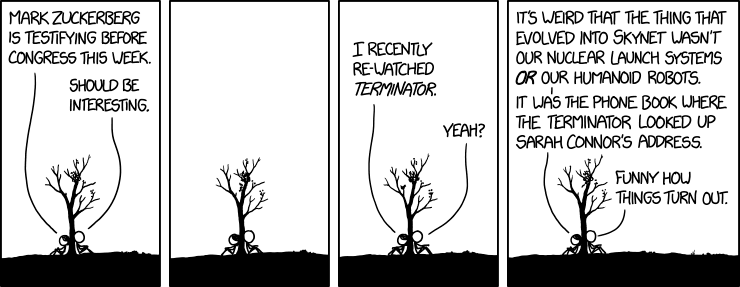
I was going to write a post on how trolls aren’t the fundamental problem with the patent system but Timothy Lee has it covered:
…trolls aren’t the primary problem with the patent system. They’re just the problem Congress is willing to fix. The primary problem with the patent system is, well, the patent system. The system makes it too easy to get broad, vague patents, and the litigation process is tilted too far toward plaintiffs. But because so many big companies make so much money off of this system, few in Congress are willing to consider broader reforms.
A modern example is Microsoft, which has more than 40,000 patents and reportedly earns billions of dollars per year in patent licensing revenues from companies selling Android phones. That’s not because Google was caught copying Microsoft’s Windows Phone software (which has never been very popular with consumers). Rather, it’s because low standards for patents — especially in software — have allowed Microsoft to amass a huge number of patents on routine characteristics of mobile operating systems. Microsoft’s patent arsenal has become so huge that it’s effectively impossible to create a mobile operating system without infringing some of them. And so Microsoft can demand that smaller, more innovative companies pay them off.
… In effect, the patent system is acting as an innovation tax, transferring wealth from companies that are creating successful technologies today to companies that acquired a lot of patents a decade ago.
A more fundamental change would be to offer patents of varying length, say 3, 7, and 20 years with the understanding that 3 year patents will be approved quickly but 20 year patents will be required to leap a high hurdle on non-obviousness, prior art and so forth. See my paper Patent Theory versus Patent Law.
My video on patents is a quick and fun introduction.
My colleague Vinod recently found the answer on Stack Overflow to something that's been bugging me for a long time - why do my Django logging configurations so often not do what I think they should?
Short answer
If you want your logging configuration to behave sensibly, set LOGGING_CONFIG to None in your Django settings, and do the logging configuration from scratch using the Python APIs:
LOGGING_CONFIG = None LOGGING = {...} # whatever you want import logging.config logging.config.dictConfig(LOGGING)
Explanation
The kernel of the explanation is in this Stack Overflow answer by jcotton; kudoes to jcotton for the answer: before processing your settings, Django establishes a default configuration for Python's logging system, but you can't override it the way you would think, because disable_existing_loggers doesn't work quite the way the Django documentation implies.
The Django documentation for disable_existing_loggers in 1.6, 1.7, and dev (as of January 8, 2015) says "If the disable_existing_loggers key in the LOGGING dictConfig is set to True (which is the default) the default configuration is completely overridden." (emphasis added)
That made me think that I could set disable_existing_loggers to True (or leave it out) and Django's previously established default configuration would have no effect.
Unfortunately, that's not what happens. The disable_existing_loggers flag only does literally what it says: it disables the existing loggers, which is different from deleting them. The result is that they stay in place, they don't log any messages, but they also don't propagate any messages to any other loggers that might otherwise have logged them, regardless of whether they're configured to do so.
What if you try the other option, and set disable_existing_loggers to False? Then your configuration is merged with the previous one (the default configuration that Django has already set up), without disabling the existing loggers. If you use Django's LOGGING setting with the default LOGGING_CONFIG, there is no setting that will simply replace Django's default configuration.
Because Django installs several django loggers, the result is that unless you happened to have specified your own configuration for each of them (replacing Django's default loggers), you have some hidden loggers possibly blocking what you expect to happen.
For example - when I wasn't sure what was going on in a Django project, sometimes I'd try just adding a root logger, to the console or to a file, so I could see everything. I didn't know that the default Django loggers were blocking most log messages from Django itself from ever reaching the root logger, and I would get very frustrated trying to see what was wrong with my logging configuration. In fact, my own logging configuration was probably fine; it was just being blocked by a hidden, overriding configuration I didn't know about.
We could work around the problem by carefully providing our own configuration for each logger included in the Django default logging configuration, but that's subject to breaking if the Django default configuration changes.
The most fool-proof solution is to disable Django's own log configuration mechanism by setting LOGGING_CONFIG to None, then setting the log configuration explicitly ourselves using the Python logging APIs. There's an example above.
The nitty-gritty
The Python documentation is more accurate: "disable_existing_loggers – If specified as False, loggers which exist when this call is made are left enabled. The default is True because this enables old behavior in a backward- compatible way. This behavior is to disable any existing loggers unless they or their ancestors are explicitly named in the logging configuration."
In other words, disable_existing_loggers does literally what it says: it leaves existing loggers in place, it just changes them to disabled.
Unfortunately, Python doesn't seem to document exactly what it means for a logger to be disabled, or even how to do it. The code seems to set a disabled attribute on the logger object. The effect is to stop the logger from calling any of its handlers on a log event. An additional effect of not calling any handlers is to also block propagation of the event to any parent loggers.
Status of the problem
There's been some recent discussion on the developers' list about at least improving the documentation, with a core developer offering to review anything submitted. And that's where things stand.



